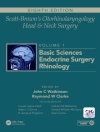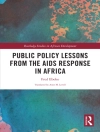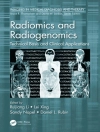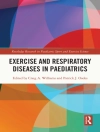Healthcare Professionalism: Improving Practice through Reflections on Workplace Dilemmas provides the tools and resources to help raise professional standards within the healthcare system. Taking an evidence and case-based approach to understanding professional dilemmas in healthcare, this book examines principles such as applying professional and ethical guidance in practice, as well as raising concerns and making decisions when faced with complex issues that often have no absolute right answer.
Key features include:
- Real-life dilemmas as narrated by hundreds of healthcare students globally
- A wide range of professionalism and inter-professionalism related topics
- Information based on the latest international evidence
Using personal incident narratives to illustrate these dilemmas, as well as regulatory body professionalism standards, Healthcare Professionalism is an invaluable resource for students, healthcare professionals and educators as they explore their own professional codes of behaviour.
表中的内容
Foreword xi
About the Authors xiii
Acknowledgements xv
Author Contributions xvii
1 Introduction 1
References 4
2 What is Healthcare Professionalism? 7
Introduction 8
Who is Responsible for Setting Professionalism Codes of Conduct? 8
What is the Ethical Basis of Healthcare Professionalism? 10
How is Professionalism Understood Across Regulatory Bodies’ Codes of Conduct? 12
How is Professionalism Linguistically Framed Across Healthcare Professionalism Codes of Conduct? 15
What are Stakeholders’ Understandings of Professionalism Across Different Country Cultures? 16
What are Students’ Understandings of Professionalism Across Country Cultures? 19
Professionalism: Embodied Identities? 23
Chapter Summary 25
References 26
3 Teaching and Learning Healthcare Professionalism 31
Introduction 32
Why Teach and Learn Professionalism? 32
What is a Curriculum? 33
How is Professionalism Taught and Learnt? 35
What Curricula‐related Professionalism Dilemmas do Healthcare Students Experience? 42
Chapter Summary 45
References 46
4 Assessing Healthcare Professionalism 51
Introduction 52
Why Assess Professionalism? 52
How is Professionalism Assessed? 53
What are the Key Challenges Facing Professionalism Assessment? 56
What Assessment‐related Professionalism Dilemmas are Learners Experiencing? 58
Chapter Summary 65
References 67
5 Identity‐related Professionalism Dilemmas 71
Introduction 71
How do Professional Identities Relate to Learning? 72
Are Professional Identities Easily Developed? 73
What are the Consequences of Professional Identities? 74
What are Identity‐related Professionalism Dilemmas? 75
What Identity‐related Professionalism Dilemmas Occur Across the Pre‐university to Year 1 Transition? 76
Identity Dilemmas Across Undergraduate Healthcare Education 78
Identity Dilemmas Across Transitions into Practice 81
Emotional impact and resistance 82
Chapter Summary 83
References 85
6 Consent‐related Professionalism Dilemmas 89
Introduction 90
What is Consent and why does it Matter? 90
What are the Common Myths about Patient consent for student involvement in their care? 93
What are Common Consent‐related Professionalism Dilemmas? 97
What is the Impact of Consent‐related Professionalism Dilemmas? 100
How do Students Act in the Face of Consent‐related Professionalism Dilemmas? 102
Chapter summary 103
References 105
7 Patient Safety‐related Professionalism Dilemmas 109
Introduction 110
How Have Patient Safety and Associated Terms been Defined? 110
What are the Factors that can Influence Patient Safety in the Workplace? 111
What Types of Patient Safety‐related Dilemmas Occur Across Different Healthcare Professions? 113
How can Healthcare Learners’ Actions and Roles Develop a Positive Workplace Culture of Patient Safety? 119
Chapter Summary 122
References 123
8 Patient Dignity‐related Professionalism Dilemmas 127
Introduction 128
What is Patient Dignity? 128
Why Does Patient Dignity Matter? 129
What are Dignity Violations and How do they Arise? 130
What Patient Dignity‐related Professionalism Dilemmas do Healthcare Learners Witness or Participate in? 133
What is the Impact of Patient Dignity‐related Professionalism Dilemmas? 139
How do Learners Act in the Face of Patient Dignity‐related Professionalism Dilemmas? 140
Chapter Summary 142
References 143
9 Abuse‐related Professionalism Dilemmas 145
Introduction 146
What are Equality, Diversity and Dignity at Work and Why Do They Matter? 146
What is Workplace Abuse and its Relationship with Power? 149
What are the Causes of Workplace Abuse? 151
What are the Consequences of Workplace Abuse? 152
What Abuse‐related Professionalism Dilemmas do Healthcare Learners Experience? 152
How can Workplace Abuse be Prevented and Managed? 158
Chapter Summary 160
References 161
10 E‐professionalism‐related Dilemmas 167
Introduction 168
What are the Benefits of OSNs for Professionalism? 168
What are the Challenges of OSNs for Professionalism? 169
What is E‐professionalism and Why is it Important? 170
What E‐professionalism Lapses do Healthcare Learners Commit? 172
What are the Repercussions for E‐professionalism‐related Lapses? 176
What are the Psychological, Social and Technological Factors Associated with Social Media Use? 177
What are the Regulatory Recommendations for the Prevention and Management of E‐professionalism Lapses? 180
Chapter Summary 181
References 182
11 Professionalism Dilemmas Across National Cultures 187
Introduction 188
What is Culture? 188
What Different Cultural Dimensions are there? 189
What are Eastern and Western Cultural Spaces? 191
How can we Develop Cultural and Intercultural Capability? 195
What are the Professionalism Dilemmas Across Different Cultural Spaces? 198
How are Situations Culturally Interpreted? Intercultural Dilemmas on Medical Electives by Western Students 202
Chapter Summary 204
References 205
12 Professionalism Dilemmas Across Professional Cultures 207
Introduction 208
What are the Roles of Different Healthcare Professionals? 209
How do Professionalism Dilemmas Compare Across Healthcare Students? 211
Interprofessional Dilemmas: Hierarchies, Roles and Conflict 214
How do Dilemmas Around Role Boundaries Come About? 218
What are Students’ Reactions and Actions in the Face of Interprofessional Dilemmas? 219
How can Interprofessional Conflict be Managed? 220
Chapter Summary 222
References 224
13 Conclusions 227
Power, Hierarchy, Conformity and Resistance 227
Negative Emotions, Empathy and Moral Distress 228
Looking Forward: Education, Training and Practice 229
Looking Forward: Research 231
Looking Back: Researcher Reflexivity 232
Coda 233
References 234
Afterword: Healthcare Professionalism: Improving Practice through Reflections on Workplace Dilemmas 237
Index 241
关于作者
About the authors
Lynn V. Monrouxe is Professor and Director of the Medical Education Research Centre at Chang Gung Memorial Hospital, Linkou, Taiwan. Charlotte E. Rees is Professor and Director of Health Professions Education and Education Research (Health PEER), and Director of Curriculum (MBBS), Faculty of Medicine, Nursing & Health Sciences, Monash University, Melbourne, Australia.












